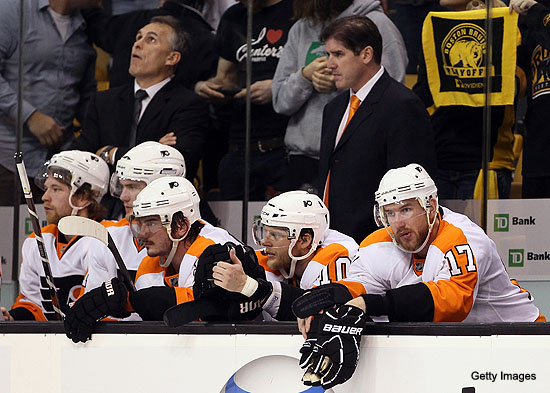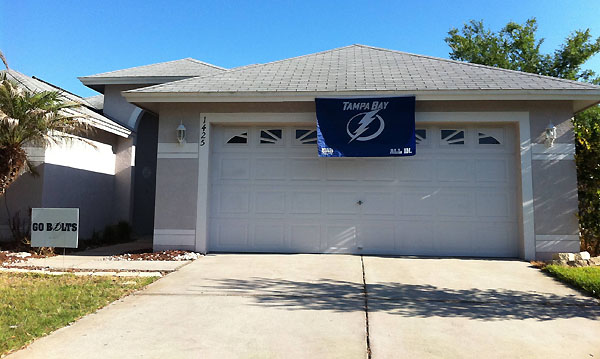The Detroit Red Wings and Philadelphia Flyers are on the verge of doing a quality impression of the Washington Capitals, with both teams being one loss away from getting swept in Round 2 of the Stanley Cup playoffs.
Towards the end of series, the Capitals looked like a fish already in the boat, sporadically thrashing back as if they could fight their way out of their situation, but their fate seemed all but sealed. It was only humane of the Lightning to whack them over the head quickly and put them out of their misery.
If the other teams hope to fight their way back into the water and live to play another day, they've got one heck of a chore in front of them. The physical part is a battle, but the mental part is a war.
I was on the wrong side of a sweep in 2008 courtesy the ECHL's Las Vegas Wranglers, and found the constantly un-met goals utterly deflating, snowballing until I wanted to come out in Game 4 and run completely through another human out of frustration (as Alex Ovechkin did against Tampa). But frustrated players going up against a group of positive, relaxed dudes just isn't a fair fight. It's how a team ends up "getting the bounces" — patience and poise create something that resembles luck, but is actually earned.
Each game and period that you fall farther behind, you execute the mental yoga necessary to convince yourself like Lloyd Christmas that there's a chance, only to have those hopes repeatedly dashed. It's tiring. As the situation grows increasingly bleak the disease of "we're done" — whether anybody is saying it or not - spreads throughout the room, sapping your will to fight.
But it takes a long time to get to that point, and this is where a coach has to excel at his job.
It's not about phony, ra-ra positivity, it's about re-routing the direction of the ship. You need to establish a checkpoint, so that guys have reason to believe it's a new beginning. You know, the "ever since the Red Wings changed to a 1-3-1 they've thwarted the Sharks offense," or "ever since the Flyers put the arena janitor in net they haven't lost" type of change.
Whether the move is overhauling the lines or implementing a switch of systems, players need reason to believe they aren't just skating down the green mile, about to bite the same lure they've seen the previous three games. At the very least, it's something else to think about other than your team's imminent demise.
The best tool a team has at a time like this is pride, and the best leaders generally have it in spades. Nobody wants to be embarrassed, and that's as motivating as anything.
This is where the expression "weather the storm" has true value for a team trying to polish an opponent off. The Bruins and Sharks have to know that their opponents will come out with a burr in their collective jock in Game 4, and they'll have to find a way to match that intensity. If the toughest game to win is the fourth, it's borne of the losing team's distaste for humiliation.
But once those teams gets through that — especially if they can head to the dressing room after the first period with a lead — they've got their opponent in the mental state comparable to submission. It's takes a strong group to fight back when you're losing in Game 4 and down 3-0 in the series (tomorrow certainly won't be easy for the B's, with the Flyers knowing they accomplished the feat just last year).
Down 3-0, a simple things like communication between players can break down — when there aren't a whole lot of positive things to say and the eggshells are piling up alongside the losses, it's best not to ask your liney why he can't make one simple decent pass, you useless moron. Frustration and Blame are not a fun couple when they're holding hands — it can be tough to stay united when they're around.
Both teams staring up from the bottom of the well in the conference semi-finals are capable of comebacks. The series' are fairly evenly matched, but as the snowballs of failure and success tumble in opposite directions, they have to find that certain something to give them a fresh start.
If they don't, they'll find themselves alongside the Washington Capitals, finding out that fishing is more than just a metaphor.



 Is there a more widely misunderstood NHL award than the Ted Lindsay Award?
Is there a more widely misunderstood NHL award than the Ted Lindsay Award?











 It's a Friday edition of Puck Daddy Radio, and we're chatting about the following and much more:
It's a Friday edition of Puck Daddy Radio, and we're chatting about the following and much more:















